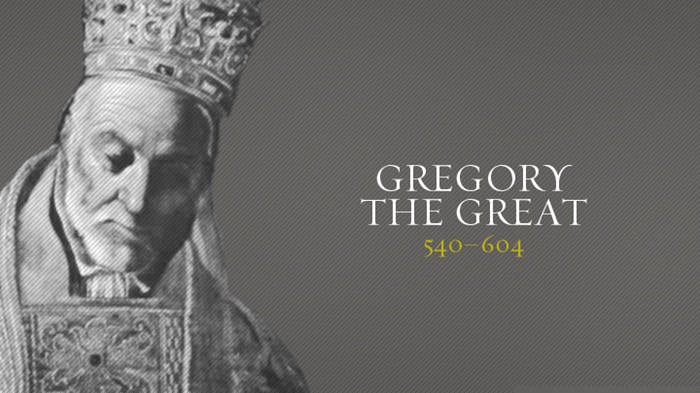– For the context of these translations click here –
 Catholic Church historians of the 20th century celebrate Pope Gregory as ‘one of the most important pastors among the popes’ (Baus), as ‘one of the most remarkable and cleanest figures on the chair of Peter’ (Seppelt/Schwaiger) and have long seen him occupying a ‘place among the great ones in the kingdom of heaven’ (Stratmann). Harnack, on the other hand, undoubtedly wiser than all the above and certainly more honest, rightly calls Gregory pater superstitionum, the father of (medieval) superstition.
Catholic Church historians of the 20th century celebrate Pope Gregory as ‘one of the most important pastors among the popes’ (Baus), as ‘one of the most remarkable and cleanest figures on the chair of Peter’ (Seppelt/Schwaiger) and have long seen him occupying a ‘place among the great ones in the kingdom of heaven’ (Stratmann). Harnack, on the other hand, undoubtedly wiser than all the above and certainly more honest, rightly calls Gregory pater superstitionum, the father of (medieval) superstition.
Gregory I often failed to intervene effectively against recalcitrant bishops or even lost the battle. He had no influence on the course of events in Spain and the conversion of the Visigoths to Catholicism. Among the Merovingians, with whom he tried to establish a dialogue with every possible concession and warning, he failed completely, without achieving the reform of the Frankish church or the synod he so desired. The Merovingian imperial church became even more independent than it already was. Even against the Longobards it had little lasting success. And even his greatest mark of honour, the conversion of England to Catholicism, soon fizzled out, although only after his death. His successors had to start afresh and built up what is falsely attributed to him.
Gregorian chant, ‘that jewel of the Church’ (Daniel-Rops), known at least by name to many who know nothing of Gregory, in no way comes from him, even if it displeases certain sentimental Christians. In reality, the liturgical changes he introduced are few and insignificant. Even so, throughout the Middle Ages the Gregorian Sacramentary, the Missal, the Gregorian Antiphonary, the sung Missal and Gregorian chant all came to be the work of Gregory, who would have reordered, corrected and expanded the traditional chants of the Church. Recent research is unanimous in denying him such merits; the evidence is compelling.
When Gregory I died on 12 March 604, the world was covered in the thickest darkness in his eyes. He was ill, in his last years he could no longer walk, lying almost always in bed, harassed and exhausted by pain. The Longobards, whom he had not tamed, were threatening Rome, whose famine-stricken population was cursing the pope. And while in the North Gregory was venerated after his death, in Rome itself he was almost forgotten for centuries: a probable consequence of the triumph of the diocesan clergy over his monastic rule.
Is it a credit to Europe that this ambitious, intolerant and poor-spirited pope could be called the ‘father of Europe’?